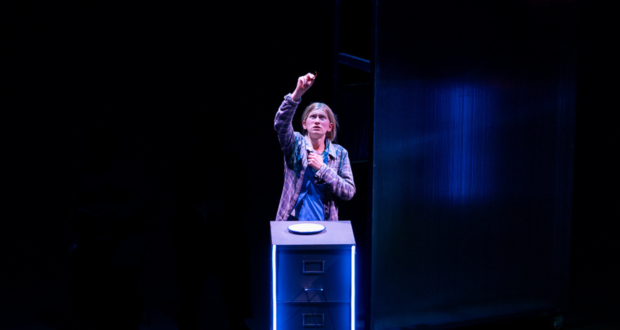A play that will make you question your own relationship with religion, whether good or bad. More than that, a powerful piece of fringe theatre that will surely drive much-needed conversations about its subject matter.Summary
Rating
Excellent
Theatre’s first job is to entertain. Its second is to educate and drive conversations forward. Nell Hardy’s I, Lord is an incredible example of a show that achieves both as it tackles spiritual abuse, a subject that all too often feels brushed under the carpet. It’s this brushing under the carpet that sits foremost within Hardy’s powerful script, with the repeated line “but what did he actually do to you?” chanted almost cult-like by the ensemble, as if to tell us unless it happened directly to us, then what right do we have to question it?
It’s all superbly assisted by the choice of venue; artists often talk about the importance of the right venue, and you have to think The Space is just that – it is, after all, an old church building. As we filter into the large room, it’s almost as if we are entering a church, with ushers welcoming us and handing out “orders of service.” This church feel is, in fact, so well done that when Eric Pollack’s Bishop loudly calls for the congregation to stand, a couple of audience members can clearly be spotted about to do just that!
The central core of I, Lord is the story of Evie (played with conviction and pure emotion by Hardy), who has returned home after years away. Evie left after making accusations against her father, who is also the priest. But her accusations were dismissed, ignored, Evie even victim blamed, causing her to be the one made to feel in the wrong and forced out of her congregation. The powerful and heart-breaking aspect of this is that she is ripped from both her biological family as well as the family of her church. Hardy’s writing tackles how religion can play such an important part in a person’s life, and the damage caused when ranks are closed to protect those within.
When the play is tackling Evie’s direct story it is an incredible piece of theatre, and one that really does have an important message. It’s when I, Lord drifts into its secondary stories that things go a little astray. There is no doubting everything has its reason to be there, with secondary plots used to demonstrate the complexities of keeping your faith even when things have gone wrong. But they take us away from that strong core, threatening to muddy the message. I’d argue the play could lose much of its final 15 minutes to become tighter and even more powerful.
Director Nell Bailey makes great use of the room, bringing the performers close enough to make us feel part of the congregation. Actors move fluidly around the space, stepping up to the pulpit to deliver moments that are quite literally sermons, offering some strong supporting performances, especially Richard Stirling’s utterly convincing turn as Evie’s father/Father Benedict, who voices indignation at the accusations against him, under the conviction that he is doing God’s work.
Hardy’s script is often breathtakingly beautiful, none more so than when delivered in hymn, the ensemble providing extra depth. It also delivers moments aimed at the audience, who certainly present a range of viewpoints– from strong beliefs to those perhaps faithless. I have to admit I even found myself questioning my relationship with religion and whether my sometimes-disparaging attitude was part of the problem that is so powerfully called out towards the end.
I, Lord holds at its heart an important message, delivered in a way that entertains, enthrals, and makes you question your own beliefs. And if a play leaves you questioning yourself, to me, that is what the best fringe theatre should be all about.
Written by: Nell Hardy
Directed by: Nell Bailey
Designed by: Victoria Maytom and Bahja Mahamed
Sound Design by: Radhika Aggarwal and Lorenzo Bassignani for Echo Chamber Audio
Lighting Design by: Amy Daniels
Movement Direction by: Marc Benga
Produced by: Response Ability Theatre
I, Lord plays at The Space until 17th February. Further information and booking can be found here. The show will then be available for a further two weeks on-demand, details here.
 Everything Theatre Reviews, interviews and news for theatre lovers, London and beyond
Everything Theatre Reviews, interviews and news for theatre lovers, London and beyond



